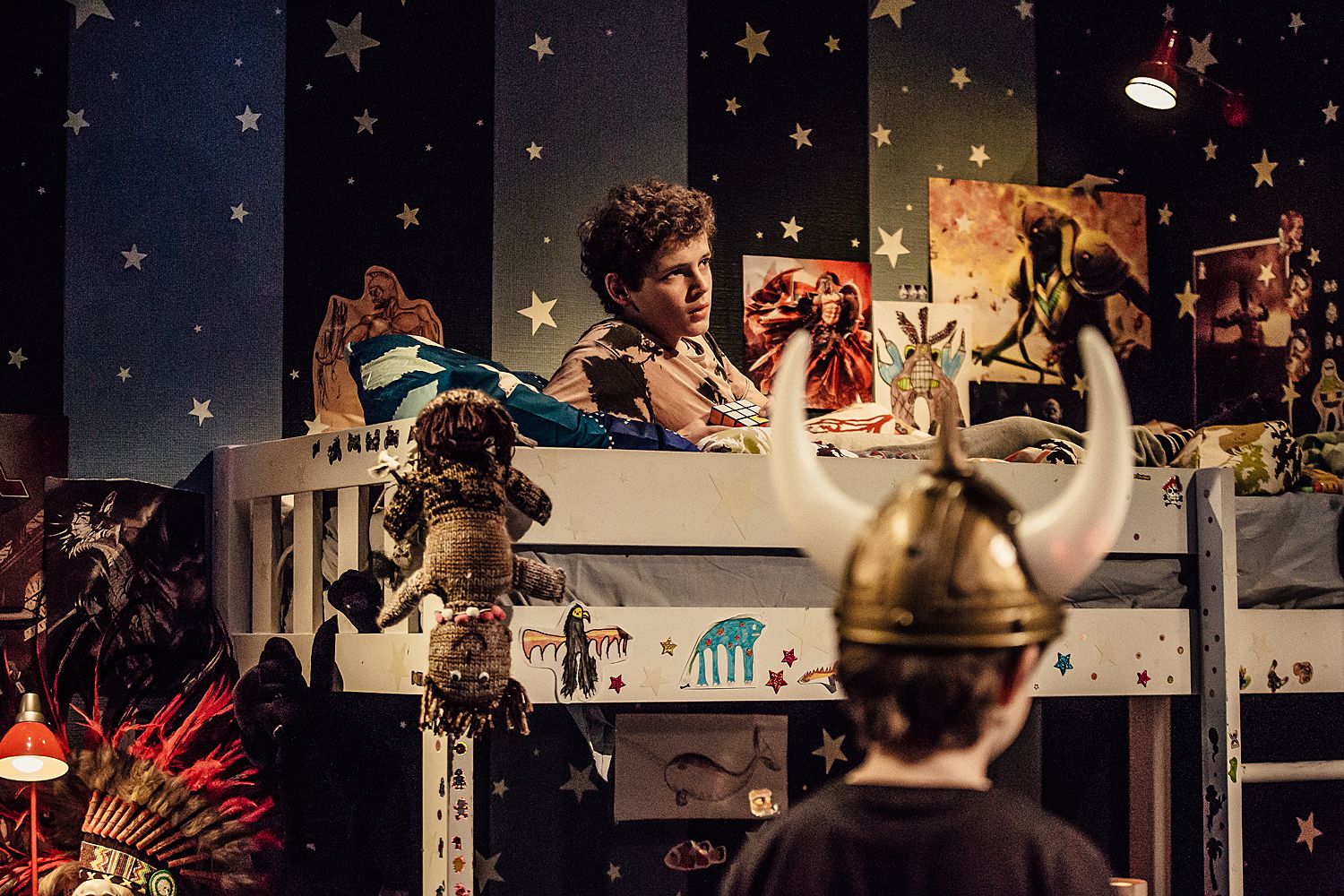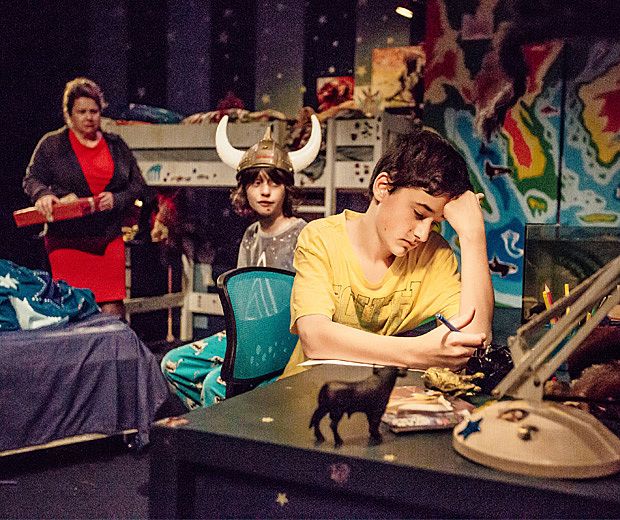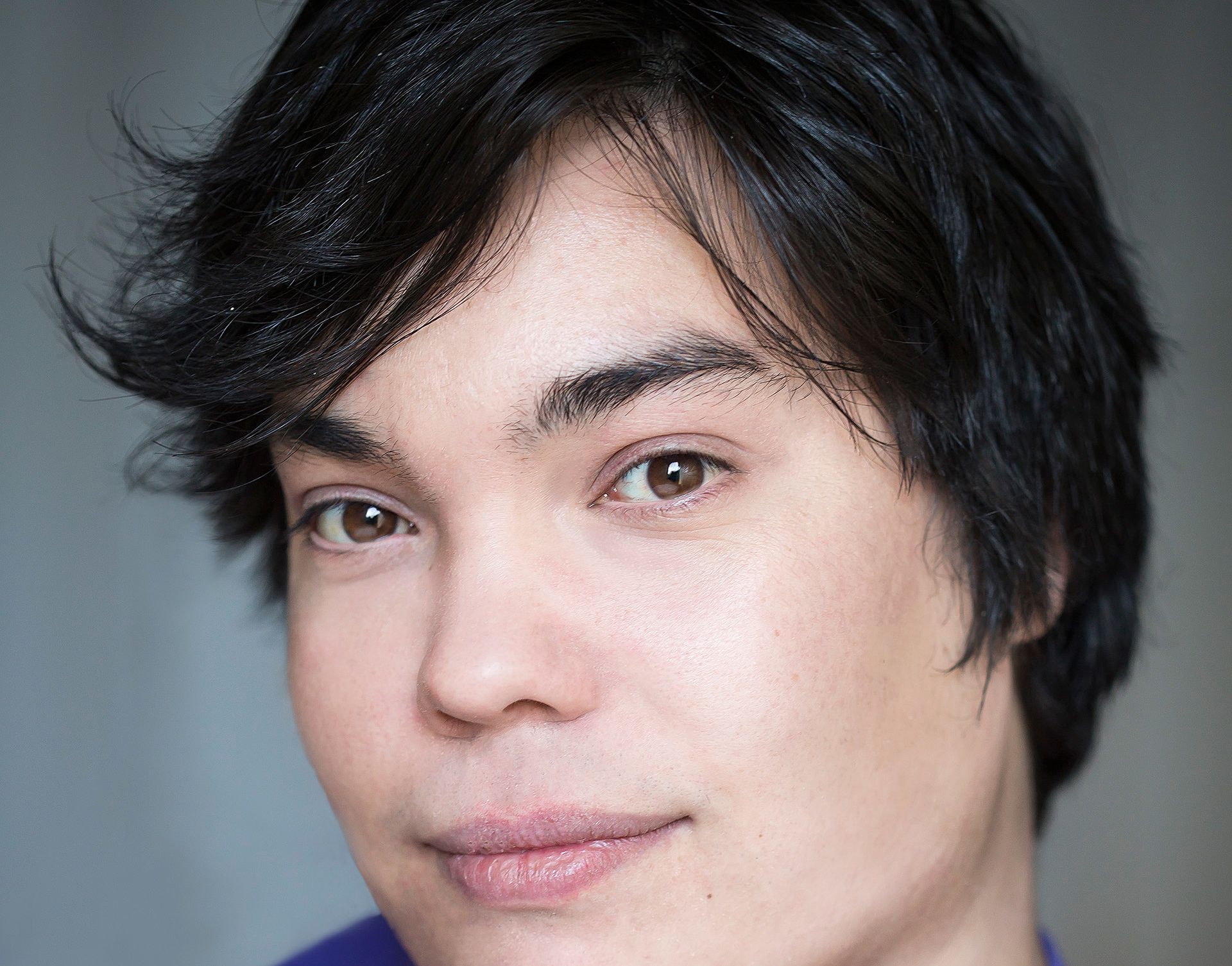Review: Medea
Silo Theatre's brilliant production of Kate Mulvany and Anne-Louise Sarks' Medea shifts the focus of this classical Greek story to the children and digs into truths upsetting and relevant.
Silo Theatre’s brilliant production of Kate Mulvany and Anne-Louise Sarks’ Medea shifts the focus of this classical Greek story to the children, and digs into truths that are both upsetting and relevant.
Reimagining a classic story can be a recipe for disaster or, even worse, boredom. It can twist the original work’s intent and content for the sake of academic superiority or a wink-wink-nudge-nudge subversion. But when it’s done well, it can transport a story into the heart and brain of a modern audience, and be as relevant and present as it was when it premiered tens, hundreds or in this case, thousands of years ago.
Euripides’ Medea is a myth that’s more famous for the conclusion than the journey. People may know it’s about a woman who kills her children as revenge against her cheating husband. It’s been performed and adapted countless times, but Kate Mulvany and Anne-Louise Sarks’ adaptation shifts the focus. Their Medea isn’t about a woman who kills her children; it’s about two children who are killed by their mother.
This shift of focus puts the audience in a state of dread as soon as they’ve read the title, seen the poster, picked up their tickets. We know these children are going to die, and we know that it’s going to be by their mother’s hand. That dread sits at the back of our heads as we see two children playing dead on the ground in what is so obviously a child’s bedroom that it’s almost a parody of it. It’s unmistakeable.
John Verryt’s set gives us a little boy’s dream bedroom; dotted with stars on the wall, posters haphazardly but lovingly pasted on the walls, stuffed animals and nerf guns littered around. This also sets us in the location of the play immediately; this isn’t a play about some people in Ancient Greece, this is in our world and time. Nothing is abstracted; nothing is left up for interpretation. This is the bedroom of two boys who are about to be killed.
The production rests on the strengths of the four actors, two each night, playing Jasper and Leon. Quinn Bevan and Joe Valentine play the younger and more tempestuous Jasper, the brother who constantly needs stimulation and who’s always distracted by the next thing to grab his attention. Aedean Burmester and Levi Kereama play the older and more plaintive Leon, the one who’s more aware of what’s going on, but not truly aware. Leon ends up being his brother’s keeper, in the most gentle and reluctant way possible, like cleaning up after him and answering big existential questions with all the quiet reason a twelve year old is capable of.
The doubling of these casts isn’t as simple as different actors playing the roles on alternating nights; it’s like watching two subtly but crucially different productions. Valentine and Kereama have a more distinct and separate brotherly relationship, with Valentine’s Jasper wanting to appeal and hang out with his brother a lot more, and Kereama’s Leon being the surly teenager doling out pearls of attention and knowledge. On the other hand, Bevan and Burmester are like a buddy cop act, with Bevan being the hyperactive and rash cop and Burmester being the more quietly reasonable cop who has to fix everything.
These different dynamics don’t shift the play hugely, but they make it more specific to each pair, as if the roles are fitting around the actors rather than the actors slotting into them. They make the play feel more authentic, more real, more present. The relationship generated between each pair of children feels more special, so that when Medea enters for the third and final time, the danger presented to that relationship feels more personal and more prescient.
All four actors have a refreshing presence; we’re never watching child actors strain for emotional beats or vocal musicality, we’re just watching kids hanging out and being kids. There are no lies here, there’s just the refreshing and unfettered honesty of kids playing with swords, of kids playing games, and kids who don’t truly understand the forces around them, just that they’re at their mercy.
The centre of this production, which everything spools out from, is Bronwyn Bradley’s Medea. Medea is a hell of a role for an actress in the play’s original form, and the brilliance of Bradley’s performance is that she brings a tremendous amount of depth, distinction and most importantly, emotional clarity with a small amount of stage time. Whereas the children are entirely present in the room, Bradley’s performance makes us aware of the world outside the bedroom. She’s always covering up something for her sons, whether it’s her real intent with a present or her feeling towards her husband. She’s a woman uncomfortably putting on the mask of a mother, and trying to maintain it for her children. It’s a credit to script, production, and actor that we can buy into the shameless forthrightness of the children playing in their bedroom and the many layers of Medea as a genuine human being.
When Medea enters the last time, with the glasses of poison we know are going to be fateful, we watch Bradley communicate with just soft affirmations and one final, world-defining speech. Her grief doesn’t rest in the tears on her face, it’s in every word she says, it’s in her shaking, heaving body and in her embracing her sons. Mulvany and Sarks’ text lays out the skeleton for a Medea we understand, but Bradley fills that out with a human being right in front of us, not a creature of myth. It’s a work of genius.
The beauty of this version of Medea is that it forces the audience to question the forces that govern us. The children have two pet fish, which they tell stories to and barter over, much as Medea is bartering with her offstage husband. The fish don’t understand, and can’t comprehend that these children are in charge of them and could ‘explode them’, as Jasper threatens to do out of excitement, at any moment.
As adults watching Medea, we understand that these children are at the mercy of their mother. We understand, largely through Bradley bridging the gap between the script and the character, why Medea does what she does, even when these children can’t. Not only do they not understand what she’s doing, they pass lightly into sleep in her embrace; they can’t understand the huge love she has for them.
Where the text, and House’s nuanced direction, succeeds is in putting us in the shoes of these children. The naturalism of the piece, from the text’s understanding of children’s jokes and lines of thought, to the performance style and set, draws us into to this as reality, not as performance. We’re not watching a piece of theatre; we’re watching two children hang out in their bedroom at the end of a long night.
When the kids turn their lights off for the shining climax, we’re transported from the audience into that bedroom, just as in awe of the universe and its infinite possibilities as those boys are. Like many Greek plays, Medea is an ode to people who are subject to forces they don’t understand and can’t control. The fish don’t understand the children, the children don’t understand Medea, and Medea doesn’t truly understand her love or her grief – what’s driving her to do this thing. For all of its shifted focus, Mulvany and Sarks keep that tragedy intact, and it’s rarely felt more relevant or more immediate than when we’re seeing two children sleeping for the last time in the warm embrace of their mother.
Medea is an essential piece of theatre. It makes the audience think differently, think beyond what is presented to us onstage, and like the best of Silo Theatre’s plays, it makes the audience think bigger. It uses a story that most of the audience knows, and uses this fact to make the story relevant, to make it pressing, to make it important. For those who don’t know the story, infamous as it is, it’s an upsetting tale, which utilises a child’s viewpoint in a chilling way that cuts right to the heart of it. It’s a reimagining of a classic that, by a clear shift of focus and brilliant production, becomes a classic in its own right.
Medea
Herald Theatre
Thursday 9 June to Saturday 9 July
Tickets and further information from Silo.


